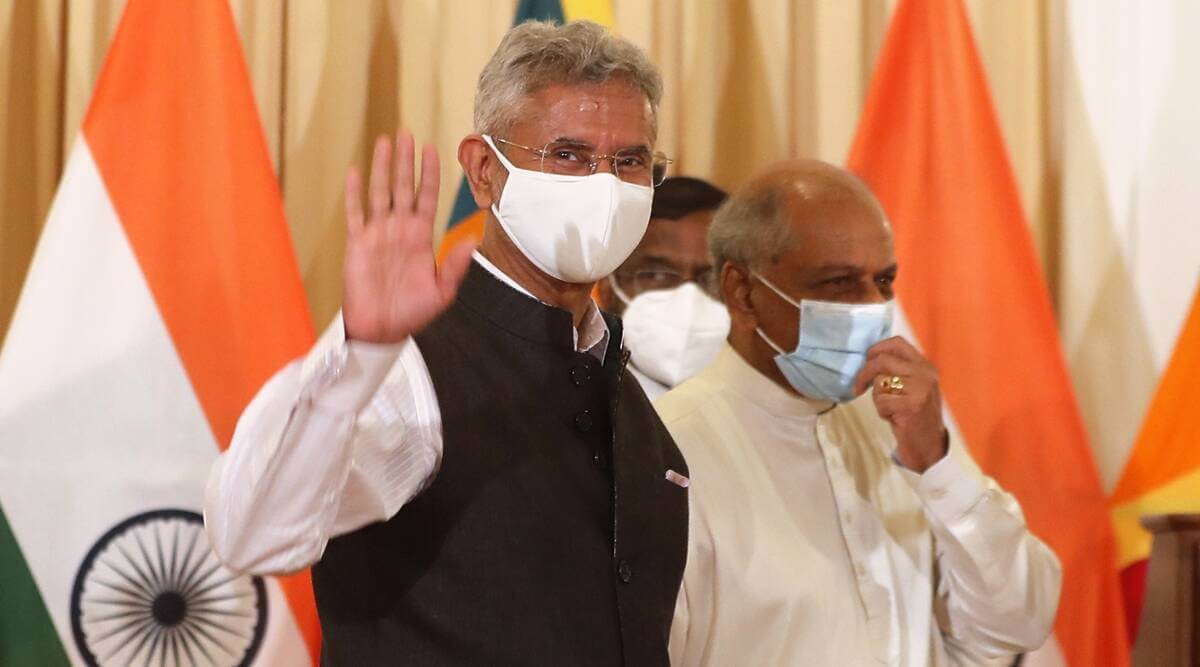Indian External Affairs Minister Dr. S. Jaishankar concluded this three-day visit to Sri Lanka, during which he met with President Gotabaya Rajapaksa, Prime Minister (PM) Mahinda Rajapaksa, Minister of Foreign Relations Dinesh Gunawardena, and Minister of Fisheries Douglas Devananda, among others.
At a joint press conference with his Sri Lankan counterpart Gunawardena, Jaishankar said it was in Sri Lanka’s “own interest” to fulfil the Tamil community’s demands for “equality, justice, peace and dignity within a united Sri Lanka”. Accordingly, he called on the Rajapaksa administration to honour its previous commitments to devolving powers to provincial councils in the Northern and Eastern Provinces, such as policing powers and control over land, through the 13th Amendment to the constitution. Referencing President Gotabaya’s vision, which is titled ‘Vistas of Prosperity and Splendour’, Jaishankar said that addressing the Tamil community’s concerns would ‘advance’ the “progress and prosperity of Sri Lanka”.
In response, Gunawardena said that President Mahinda has already “firmly stated” his commitment to “all our citizens—Sinhala, Tamil, Muslim”. He then thanked India for its “tremendous support” during the ongoing pandemic through its ‘Neighbourhood First’ policy.
That Gunawardena’s response made no specific mention of the 13th Amendment is telling, given that both Rajapaksa brothers have expressed their reluctance to fully implement it. In fact PM Mahinda has previously said that any resolutions that are “not acceptable to the majority community” of Sri Lanka will not be fulfilled, once again reaffirming his commitment to Sinhala nationalism at the expense of reconciliation for Tamils.
To illustrate the Indian government’s commitment to the Tamil community in Sri Lanka, EAM Jaishankar also met with the Tamil National Alliance (TNA) leadership, where he “discussed issues pertaining to development and devolution and the role of Provincial Councils”. He also met with a delegation of the Tamil Progressive Alliance (TPA).
On the topic of trade, neither of Jaishankar nor Gunawardena made mention of the East Container Terminal (ECT) project at the Colombo Port, which India holds a keen interest in. Furthermore, although President Gotabaya’s statement following his meeting with Jaishankar said that the ECT is a potential avenue for cooperation between New Delhi and Colombo, PM Mahinda reportedly told Parliament that the government had not yet made any decision on the matter. India and Sri Lanka have previously discussed the ECT, the development of a liquefied natural gas (LNG) power plant, the construction of houses and roads, alongside other research, communication technology, and alternative energy initiatives, as possible channels through which the two countries can bolster bilateral ties.
The ECT project has been opposed by local unions and workers despite India and Japan signing a tripartite Memorandum of Cooperation (MoC) in 2019. The MoC stated that the Sri Lanka Port Authority (SLPA) would retain 100% ownership but that the terminal would be divided between the three parties, with Sri Lanka maintaining a 51% share. However, many port workers have vehemently opposed foreign involvement in “national assets”, which has put the brakes on the advancement of the deal.
Jaishankar, for his part, did not comment on the status of India’s response to Colombo’s request for a loan moratorium and a special currency swap facility of $1 billion.
However, Jaishankar and Gunawardena did discuss “several proposals for cooperation in energy, infrastructure and connectivity” and the Indian official pushed Sri Lankan authorities to expedite these pending agreements. In fact, Jaishankar noted that the India-Sri Lanka Joint Working Group had met to deliberate over these deals on December 30.
Jaishankar also called on Colombo to release 36 Indian fishermen who were arrested for crossing the maritime boundary between the two countries. The topic was also discussed during his meeting with Minister of Fisheries Devananda.
During his visit, the Indian official also met with opposition leader Sajith Premadasa, and with former Prime Minister Ranil Wickremesinghe, who leads the United National Party. In addition, he also spoke with State Minister of Estate Housing and Community Infrastructure Jeevan Thondaman and Sathasivam Viyalendiran, who is the State Minister for Backward Rural Areas Development and Promotion of Domestic Animal Husbandry and Minor Economic Crop Cultivation. He also held discussions with multiple business leaders.
Meanwhile, President Gotabaya requested India to honour its commitment to “give priority to Sri Lanka” once it was ready to supply vaccines to other countries. In addition, the two sides pledged to boost maritime ties. This follows a trilateral meeting between India, Sri Lanka, and the Maldives in November, when the three sides agreed to bolster collaboration on the “common security threats” posed by terrorism and cybersecurity threats in the Indian Ocean region. They also agreed to expand their intelligence sharing and cooperate on issues such as “terrorism, radicalisation, extremism, drugs, arms and human trafficking, money laundering, cybersecurity and effect of climate change on the maritime environment”.
Indian EAM Jaishankar Concludes Sri Lanka Trip, Discusses Trade and Tamil Reconciliation
Indian External Affairs Minister Dr. Jaishankar concluded his three-day visit to Sri Lanka, during which he met with various government officials, as well as the opposition and Tamil politicians.
January 8, 2021

IMAGE SOURCE: ERANGA JAYAWARDENA / APIndian External Affairs Minister Dr. Jaishankar
